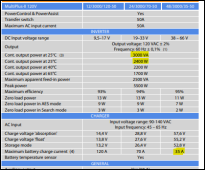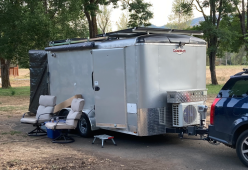stroodle96
New Member
- Joined
- Sep 23, 2022
- Messages
- 20
Hello,
I wanted to make a post with my current ideas for power solutions in our travel trailer.
Use Case:
I will soon be living full time in a travel trailer for about 1 year. My tow vehicle is a F150 powerboost with the 7.2kwh onboard power. I will be using the trucks generator function for all of my power generation when not plugged into a campsite. I want to install a small to medium sized battery bank in the travel trailer and have all our power run through an inverter. This is so we can not have to run the truck 24/7, especially at night or if it is in for service.. We can just plug into the truck to top up the batteries for a few hour each day as needed. I want to go with an all in one unit for simplicity and compactness, I also may want to add solar panels in the future and plan to prewire some mc4 connectors on the roof to make install easier later.
Current Plan/Ideas:
I plan to rewire the shore power to be the input to the inverter and will run a 30 amp connection up to hitch that will connect to the truck or shore power. Then connect the inverter output directly into the existing power distribution panel in the camper. I want to replace the existing converter with a Victron 48V to 12V converter to run the DC systems. This way all 120v power to the camper will run through the all in one inverter, including the A/C which will be the biggest draw. I will disconnect the existing 12v battery from the distribution panel and leave it in place to only operate the trailer brakes thru the breakaway switch, its my understanding that when the 7 pin is connected to the truck, it will still charge the breakaway battery.
My trailer currently has 30amp shore connection, but even with the A/C running it never uses more than 2000 watts(minus the startup draw, which I plan to manage by installing a soft start device on the A/C). We will be adding our work laptops and monitors to the power demand as well, but I don't expect that to add more than 500watts or less. I am thinking with an A/C soft start device, that I can get away with a 48V 3000W inverter.
Inverter:
I really like the new EG4 3000EHV-48 all in one unit. I know it would only be able to supply 25amps at 120V but I am thinking that will be enough, since my trailer never seems to use the full 30amp service it has now unless the a/c is powering on.
- Does anyone have suggestions for a good all in one unit that is better than the EG4 3000W-48V? Maybe something that would give me 3600W or more? Again, I am not sure I need the extra watts, but if prices are similar, I would rather have more power available than I need. I thought about their 6500W model, but that is just way overkill for what I need.
Batteries:
I am going back and forth between EG4-LL V2, SOK, or Trophy battery server rack batteries. I want to be able to use solar assistant, so I think that rules out trophy batteries, although the heaters would be nice just in case. EG4 makes sense if I am getting their inverter, and I like the longer warranty and fire arrestors of the LL V2 model. I have heard some not so great things about EG4's batteries on this forum. SOK's seem to be more reliable based on what I am reading in other posts.
- What is everybody's thoughts on these batteries? Any other suggestions? I want something reliable and something I can monitor with solar assistant.
- Are the fire arrestors in EG4-LL V2 battery really necessary? I thought these batteries were already pretty safe and could not explode or catch fire on there own??
Questions:
- I have so many questions, some I will split out into different posts once I have decided on the equipment. To start, I just want some feedback and suggestions on the inverter and batteries that will fit my use case well.
- Mounting Locations? I was thinking under the fridge, oven, or sink. There are water lines and propane lines that run near anyplace I would mount it, should I be concerned about this? Only other place I can think would be under the bed, and it makes me nervous to be sleeping on a DIY system with so much potential energy.
- Anyone have experience with keeping the breakaway battery separate? Will it stay charged off the 7pin adapter while towing? It should never have any draw on the battery so I would think the 7pin connection would keep it topped up.
- Is 48V overkill? From what I saw, any system over 3000W should be looking at 24V or 48V, and there seem to be way more options for 48V. And prices are pretty much the same so it seem to make more sense to go 48V.
Thanks!
I wanted to make a post with my current ideas for power solutions in our travel trailer.
Use Case:
I will soon be living full time in a travel trailer for about 1 year. My tow vehicle is a F150 powerboost with the 7.2kwh onboard power. I will be using the trucks generator function for all of my power generation when not plugged into a campsite. I want to install a small to medium sized battery bank in the travel trailer and have all our power run through an inverter. This is so we can not have to run the truck 24/7, especially at night or if it is in for service.. We can just plug into the truck to top up the batteries for a few hour each day as needed. I want to go with an all in one unit for simplicity and compactness, I also may want to add solar panels in the future and plan to prewire some mc4 connectors on the roof to make install easier later.
Current Plan/Ideas:
I plan to rewire the shore power to be the input to the inverter and will run a 30 amp connection up to hitch that will connect to the truck or shore power. Then connect the inverter output directly into the existing power distribution panel in the camper. I want to replace the existing converter with a Victron 48V to 12V converter to run the DC systems. This way all 120v power to the camper will run through the all in one inverter, including the A/C which will be the biggest draw. I will disconnect the existing 12v battery from the distribution panel and leave it in place to only operate the trailer brakes thru the breakaway switch, its my understanding that when the 7 pin is connected to the truck, it will still charge the breakaway battery.
My trailer currently has 30amp shore connection, but even with the A/C running it never uses more than 2000 watts(minus the startup draw, which I plan to manage by installing a soft start device on the A/C). We will be adding our work laptops and monitors to the power demand as well, but I don't expect that to add more than 500watts or less. I am thinking with an A/C soft start device, that I can get away with a 48V 3000W inverter.
Inverter:
I really like the new EG4 3000EHV-48 all in one unit. I know it would only be able to supply 25amps at 120V but I am thinking that will be enough, since my trailer never seems to use the full 30amp service it has now unless the a/c is powering on.
- Does anyone have suggestions for a good all in one unit that is better than the EG4 3000W-48V? Maybe something that would give me 3600W or more? Again, I am not sure I need the extra watts, but if prices are similar, I would rather have more power available than I need. I thought about their 6500W model, but that is just way overkill for what I need.
Batteries:
I am going back and forth between EG4-LL V2, SOK, or Trophy battery server rack batteries. I want to be able to use solar assistant, so I think that rules out trophy batteries, although the heaters would be nice just in case. EG4 makes sense if I am getting their inverter, and I like the longer warranty and fire arrestors of the LL V2 model. I have heard some not so great things about EG4's batteries on this forum. SOK's seem to be more reliable based on what I am reading in other posts.
- What is everybody's thoughts on these batteries? Any other suggestions? I want something reliable and something I can monitor with solar assistant.
- Are the fire arrestors in EG4-LL V2 battery really necessary? I thought these batteries were already pretty safe and could not explode or catch fire on there own??
Questions:
- I have so many questions, some I will split out into different posts once I have decided on the equipment. To start, I just want some feedback and suggestions on the inverter and batteries that will fit my use case well.
- Mounting Locations? I was thinking under the fridge, oven, or sink. There are water lines and propane lines that run near anyplace I would mount it, should I be concerned about this? Only other place I can think would be under the bed, and it makes me nervous to be sleeping on a DIY system with so much potential energy.
- Anyone have experience with keeping the breakaway battery separate? Will it stay charged off the 7pin adapter while towing? It should never have any draw on the battery so I would think the 7pin connection would keep it topped up.
- Is 48V overkill? From what I saw, any system over 3000W should be looking at 24V or 48V, and there seem to be way more options for 48V. And prices are pretty much the same so it seem to make more sense to go 48V.
Thanks!





